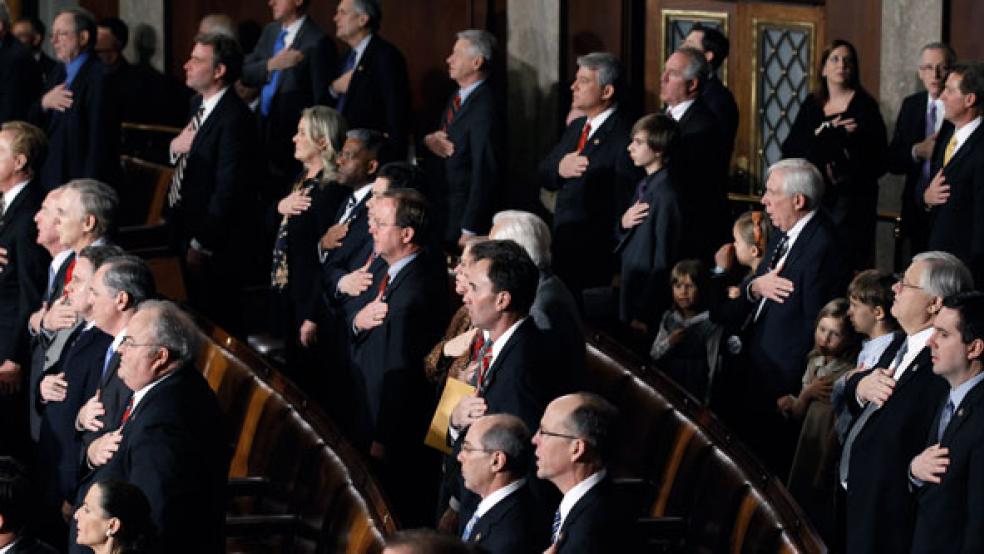As a radically new looking 112th Congress was called to order Wednesday, the House’s now Republican-led majority voted overwhelmingly to elect Rep. John Boehner, R-Ohio, speaker.
“We gather here today at a time of great challenges,” Boehner said, fighting back tears in his first speech as speaker. “Hard work and tough decisions will be required of the 112th Congress. No longer can we fall short. The people voted to end business as usual and today we begin carrying out their instructions.”
In the hours before the 110 members-elect were sworn in for what could be two years filled with partisan divide, the Capitol was teeming with families and impassioned supporters vying to meet their new representatives. But office celebrations were cut short as members-elect rushed to the House floor to be sworn in and cast their first votes.
Freshmen Republicans have openly criticized their predecessors, and promised to change the priorities of Congress to more accurately reflect the electorate. Among those promises, Republicans have overwhelmingly called for a $100 billion cut in domestic spending this year, an amount they now acknowledge as economically infeasible. Boehner and House Majority Leader Eric Cantor, R-Va., however, vow to push one spending cut bill a week through the House for the first three months of the legislative body’s first session.
Freshman Republican Mike Kelly of Pennsylvania believes getting spending under control would be a good start for Congress. “We have to be serious about this and we can’t talk in pennies,” he told The Fiscal Times. “I think that was the message in November and I’m hoping people don’t lose track of that.”
A vote on raising the debt ceiling, expected in March, is also stirring up controversy. House GOP members need to decide whether to follow the Tea Party’s calls to oppose raising the debt ceiling, which is currently about $500 million short from the $14.3 trillion limit.
If Congress fails to raise the ceiling the country would temporarily default on its debt, effectively shutting down the government until a compromise could be reached. Most Republicans say they want to avoid a government shutdown, but are not prepared to vote for an increase without a plan.
“If we are purely just going to increase the limit on the credit card and not change our spending habits, than that is a catastrophe,” said freshman Bill Huizenga, R-Mich.
“People want money to be used efficiently, and that’s something all of us recognize regardless of our party affiliation,” added freshman Democrat Hansen Clarke of Michigan. “But there are many ways to feed that objective, while helping people get back on their feet financially.”
Democrat David Cicilline of Rhode Island, a former mayor of Providence, is one of the “noble nine” freshmen Democrats sworn into the House today alongside his 85 new Republican colleagues. Cicilline wants the next two years to be about examining every part of the government and weeding out ineffective, costly programs, in order to free up funding for infrastructure investment — one of his top priorities.
“When you’re the mayor of a city, you don’t have a Republican pothole or a Democratic tree that needs to be cut,” he told The Fiscal Times. “You just need to get stuff done, and I think that’s what we need in Congress.”
Repealing President Obama’s signature legislative achievement, the Affordable Care Act, is another point of attack for Republicans.
“Repealing health care is both a symbolic and substantive move that the Republicans have to make,” said Huizenga.
There will be a House vote on January 12. Even if there are enough votes to repeal it, Senate Democrats have already threatened to block the initiative from reaching the Senate floor.
Meanwhile, Democrats will likely harness whatever remaining legislative power they still hold to protect their sacred cows of domestic policy — the health care law and entitlement programs such as Social Security and Medicare, which the President’s fiscal commission proposed to trim.
Rep. Colleen Hanabusa, D-Hawaii, says the entire health care repeal exercise is a total “waste of time” that will detract from the newly-formed body’s more important task of nursing the American economy back to health.
“No one’s ever going to be 100 percent happy with any piece of legislation that’s 2,000 pages long,” she said. “But repeal is not the answer.” Instead, Hanabusa, who previously served 12 years in the Hawaii state legislature, suggests the new Congress craft job-creating legislation and invest more in alternative renewable energy sources.
Despite the partisan bickering, Wednesday mostly belonged to Boehner and the Republicans. Though the passing of the gavel from Rep. Nancy Pelosi, D-Calif., to Boehner had been considered a foregone conclusion, 19 Democrats added a little drama to the procession by voting against Pelosi, the first-ever woman speaker, during roll call.
However, before surrendering her post, Pelosi reminded the new Congress of the last session’s accomplishments, including the embattled health care reform, the repeal of the “Don’t Ask, Don’t Tell” and financial oversight reform, respectively.



